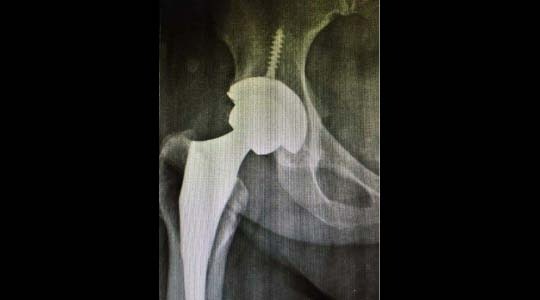
Hip Replacement: Restoring Mobility with Dr. Abhay Chhallani
Consultant at Apollo Hospital, MPCT Hospital
Over 10,000 Successful Cases and Counting
If you’re dealing with persistent hip pain or decreased mobility that hasn’t responded to conservative treatments, it may be time to explore the life-changing world of hip replacement surgery. Dr. Abhay Chhallani, with his extensive experience in completing more than 10,000 hip replacement cases, is a trusted expert in the field. He practices at the renowned Apollo Hospital and MPCT Hospital, where he leads the best team of rehabilitation specialists in the region.
What is Hip Replacement?
Hip replacement surgery, also known as total hip arthroplasty, is a surgical procedure that involves the replacement of part or all of the hip joint with an artificial, functional device called a prosthesis. The prosthesis includes a liner to facilitate smooth joint movement, effectively restoring your ability to walk, move, and live pain-free.
Who Needs Hip Replacement?
Hip joint problems can arise from various causes, including avascular necrosis of the femoral head, osteoarthritis, trauma, local tears, infection, or other diseases. Common conditions that may necessitate hip replacement surgery include:
- Avascular Necrosis of the femoral head leading to hip arthritis
- Degenerative hip conditions resulting in arthritis
- Hip fractures
- Femoral Acetabular Impingement (FAI)
- Genetic factors
- Rheumatoid Arthritis
- Perthes’ Disease
- Slipped Capital Femoral Epiphysis
- Developmental Dysplasia of hips
- Ankylosing Spondylitis
Symptoms of Hip Problems
If you’ve been experiencing prolonged symptoms that indicate serious hip issues, it’s essential to seek medical attention. These symptoms may include:
- Pain in the hip joint, especially in the groin area
- Radiating pain from the hip to the thigh and knee
- ‘Clunking’ in the hip
- Difficulty walking, leading to a limp
- Muscle stiffness
Hip pain is often exacerbated by simple activities such as putting weight on your leg or rising from a chair. Additionally, you may experience referred pain, which can be felt down the front of the leg and buttock. Other symptoms may include a loss of full range of motion, an inability to fully bend or straighten the hip, a tendency for the hip to ‘get stuck’ or lock up, and audible ‘clicking’ or a sense of ‘grating.’
Diagnosis of Hip Disorders
Medical professionals can often diagnose hip disorders through a physical examination. This examination assesses the hip joint and leg bones to pinpoint the cause of your symptoms. Diagnosis is typically confirmed through X-rays and/or MRI scans of the hips.
Hip Replacement Surgery
While surgery isn’t necessary for everyone, when it’s recommended, Dr. Abhay Chhallani tailors each patient’s treatment path to their unique needs. Hip replacement surgery involves the removal of the diseased joint and bone, followed by the insertion of a new ball and socket joint. The procedure is designed to alleviate pain, improve mobility, and enhance the quality of life.
Benefits of Hip Replacement Surgery
The decision to undergo hip replacement surgery is a collaborative one between the patient, the surgeon, and their family. Benefits of the surgery may include:
- Reduced hip pain
- Increased mobility and movement
- Correction of deformity
- Equalization of leg length (not guaranteed)
- Increased leg strength
- Improved quality of life, enabling a return to normal activities
- The ability to sleep without pain
The Surgical Procedure
The hip replacement surgical procedure involves several key steps:
- An incision is made over the hip to expose the hip joint.
- The acetabulum (socket) is prepared using a specialized reamer, and the acetabular component is inserted.
- The femur (thigh bone) is prepared, and the femoral component is inserted into the femur.
- The real femoral head component is placed on the femoral stem.
- The hip is reduced for the final time, and the muscles and soft tissues are carefully closed.
Post-Operative Care and Rehabilitation
Following surgery, the patient is monitored in the recovery room, with a focus on vital signs. Drains and dressings are managed, and post-operative X-rays are performed. Most patients are discharged 3-5 days after surgery, depending on pain management and available support at home. Sutures are typically removed around 14 days post-surgery.
Rehabilitation, guided by a trained physiotherapist and Dr. Abhay Chhallani’s expert rehabilitation team, is essential for the best outcomes after surgery. A tailored exercise program will help you regain your strength and mobility, ensuring a successful recovery. About Hip Prostheses
Dr. Abhay Chhallani offers a range of hip prosthesis options, each designed with different materials and bearing surfaces to suit individual patient needs. Your choice of prosthesis will be made with your best interests in mind, ensuring long-term functionality and comfort.
With over 10,000 completed hip replacement cases, Dr. Abhay Chhallani is a trusted expert who can help you regain your mobility and your life.
If you’re experiencing hip pain and decreased mobility, schedule a consultation at Apollo Hospital or MPCT Hospital to explore your treatment options and take the first step towards a pain-free, active future. Your journey to a healthier, happier you begins here.
